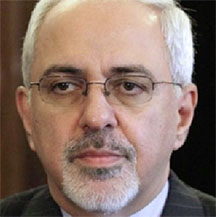DUBAI, (Reuters) – Iranian Foreign Minister Mohammad Javad Zarif rejected U.S. Secretary of State John Kerry’s pinning of blame on Iran for the lack of a deal on its nuclear programme last week, saying splits between Western countries prevented a breakthrough.

Responding to remarks by Kerry in Abu Dhabi on Monday, Zarif said that singling out Iran only served to undermine confidence in the Geneva negotiations, which will resume on Nov. 20.
The United States, European Union powers and Iran worked hard for months on a proposal to help end the 10-year standoff over Iran’s nuclear activity, diplomats said. Hopes for a deal rose so high that foreign ministers of six world powers travelled to Geneva to put their weight behind the talks.
But by Saturday, the unscheduled third day of negotiations, French Foreign Minister Laurent Fabius said Paris could not accept a “fool’s game” – in other words, one-sided concessions to Iran – and the negotiations broke off without agreement.
Diplomats from other Western nations at first reacted angrily and accused the French of trying to upstage the other powers and causing unnecessary trouble for the talks.
On Monday though, Kerry said the major powers were unified on Saturday when they presented a proposal to the Iranians. “The French signed off on it, we signed off on it, and everybody agreed it was a fair proposal. There was unity, but Iran couldn’t take it at that particular moment, they weren’t able to accept that particular thing,” Kerry told reporters.
The White House backed that up on Tuesday, with spokesman Jay Carney saying Washington and its key allies were united in Geneva and “we remain united.”
Zarif denied the Islamic Republic was to blame.
“Mr Secretary, was it Iran that gutted over half of U.S. draft Thursday night? and publicly commented against it Friday morning?” Zarif asked on Twitter.








